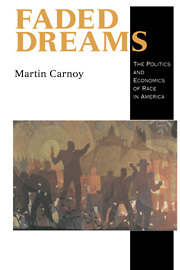Book contents
- Frontmatter
- Contents
- Preface
- 1 Introduction
- 2 The ups and downs of African-American fortunes
- 3 The politics of explaining racial inequality
- 4 Are blacks to blame?
- 5 Is the economy to blame?
- 6 Have racism and discrimination increased?
- 7 Politics and black educational opportunity
- 8 Politics and black job opportunities: I
- 9 Politics and black job opportunities: II
- 10 Black economic gains and ideology: the White House factor
- 11 Is there any hope for greater equality?
- Appendix A
- Appendix B
- Notes
- Index
7 - Politics and black educational opportunity
Published online by Cambridge University Press: 06 October 2009
- Frontmatter
- Contents
- Preface
- 1 Introduction
- 2 The ups and downs of African-American fortunes
- 3 The politics of explaining racial inequality
- 4 Are blacks to blame?
- 5 Is the economy to blame?
- 6 Have racism and discrimination increased?
- 7 Politics and black educational opportunity
- 8 Politics and black job opportunities: I
- 9 Politics and black job opportunities: II
- 10 Black economic gains and ideology: the White House factor
- 11 Is there any hope for greater equality?
- Appendix A
- Appendix B
- Notes
- Index
Summary
For the black minority in the United States, process is inexorably tied to national politics. For better or worse, government has been a major player in defining how blacks participate in the economy and society. Proponents of both the individual-responsibility and pervasive-racism explanations claim that government intervention holds blacks back, but for very different reasons. According to individual responsibility, this is because government intervention in the free market, even if intended to be helpful, makes conditions worse. According to pervasive racism, it is because U.S. politics and markets are biased against blacks – so government can't help but maintain discriminatory practices, by, among other things, tacitly supporting them in private business.
Neither of these explanations correctly characterizes the way politics has affected blacks' position in the economy. Usually in response to changing economic and social conditions (including social movements that raise consciousness on certain issues), voters periodically change our national political leadership. With new presidential mandates and new Congresses come new government approaches to economic and social problems. The Roosevelt administration did not deal with the economic crisis in the 1930s in the same way as the Hoover-led 1920s Republicans. Eisenhower's approach to domestic issues in postwar America was not the same as Truman's before him or Kennedy's and Johnson's after. And Ronald Reagan's position on most issues was philosophically far from John Kennedy's or Lyndon Johnson's.
Changes in national leadership have usually meant distinctly different national policies toward race.
- Type
- Chapter
- Information
- Faded DreamsThe Politics and Economics of Race in America, pp. 127 - 149Publisher: Cambridge University PressPrint publication year: 1994



